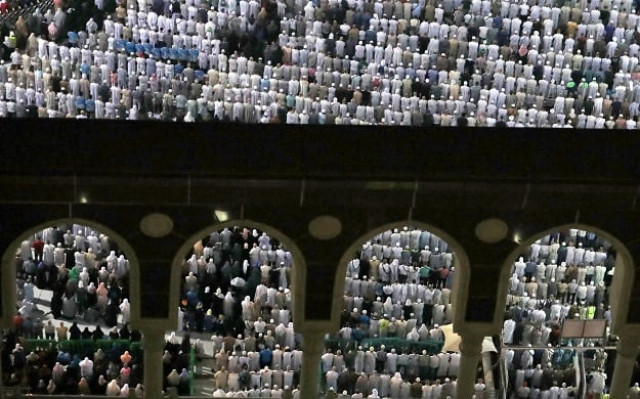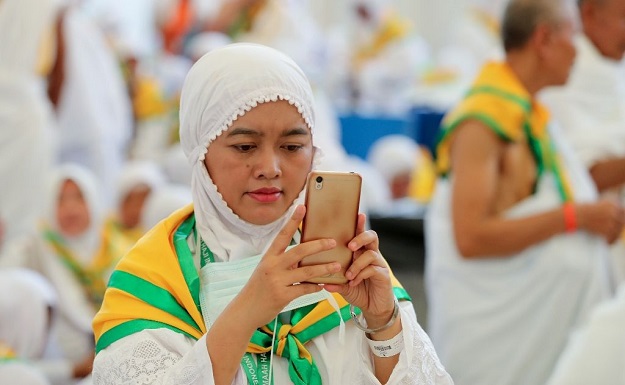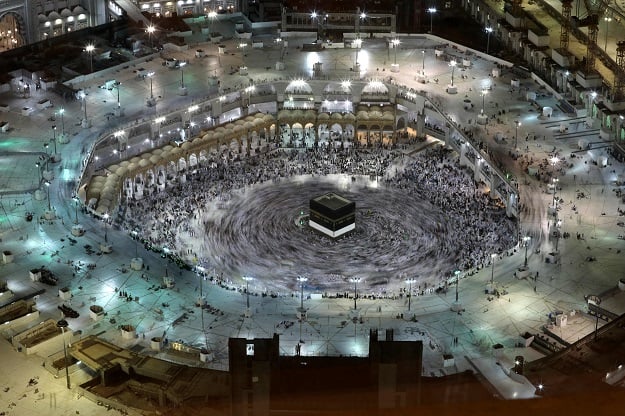Two million pilgrims converge on Makkah for Hajj
Hajj is one of five pillars of Islamic faith

Muslim pilgrims perform prayers at the Grand Mosque in Saudi Arabia's holy city of Makkah. PHOTO: AFP
This year sees the return of pilgrims from Shia Iran, regional rival to Sunni powerhouse Saudi Arabia, and comes with the Gulf mired in political crisis and Islamic State group militants squeezed in Iraq and Syria.
"I'm so excited because many people dream of coming to this place," said 47-year-old Eni from Indonesia, her face framed in a sand-coloured veil trimmed with lace. "We feel more religious when we leave this place," she said.
Saudi factory stitches gold-laced cover for Kaaba
Indonesia is the world's most populous Muslim nation, and it also provides the largest number of pilgrims for the hajj. Eni's compatriots throng Jeddah airport 80 kilometres west of Makkah, as tens of thousands of pilgrims pass through the gateway to the hajj every day.
But Eni is almost oblivious to the hubbub that surrounds her as she studies her Holy Quran in the oppressive heat, pearls of sweat beading her face.
 A pilgrim uses her cellphone on arrival at Jeddah airport on August 26, 2017, ahead of the annual hajj pilgrimage. PHOTO: AFP
A pilgrim uses her cellphone on arrival at Jeddah airport on August 26, 2017, ahead of the annual hajj pilgrimage. PHOTO: AFP"After my first pilgrimage I felt I wanted to come back to feel myself close to him," she said of the Prophet Muhammed [PBUH] before returning her attention to the Holy Quran.
The Hajj is one of the five pillars of the Islamic faith, which every Muslim is required to complete at least once in a lifetime if he or she has the means to do so.
"This year we expect around two million pilgrims," Abdelmajeed Mohammad Al-Afghani, director of Hajj and Umra affairs, told AFP.
Iranians are back after not attending in 2016 following a deadly Makkah stampede the previous year that killed nearly 2,300 pilgrims.
It was the worst catastrophe in the history of the Hajj, with 464 people from the Islamic republic among the dead.
 This long exposure photograph shows Muslim pilgrims during Tawaf at the Grand Mosque in Saudi Arabia's holy city of Makkah. PHOTO: AFP
This long exposure photograph shows Muslim pilgrims during Tawaf at the Grand Mosque in Saudi Arabia's holy city of Makkah. PHOTO: AFPFollowing the disaster, Tehran railed against Saudi Arabia's organisation of the pilgrimage. The two countries then severed diplomatic relations in January 2016 after the Saudi embassy in Tehran was ransacked by a crowd protesting against the execution in the kingdom of a Shia religious dignitary.
Analysts say that neither Riyadh nor Tehran has any wish to prolong the dispute.
"To politicise an event like this does no good," according to Slimane Zeghidour, author of "La vie quotidienne à La Mecque: De Mahomet à nos jours" [Daily Life in Makkah from Muhammed to Today].
Accusations of the Hajj being politicised have marred the region for some time. For nearly three months, the Gulf has been embroiled in its worst ever political crisis, with Saudi Arabia and its allies facing off against Qatar, which they accuse of being too close to Iran and backing extremism.
A boycott imposed on the small but gas-rich emirate since June 5 has resulted in Qatar's land, sea and air links being badly affected. This has also had a knock-on effect on hajj-related travel, although Riyadh announced it was relaxing certain restrictions for pilgrims.
In the arrivals hall at Jeddah airport, determined pilgrims walk hastily to avoid losing contact with other members of their group.
"I'm so happy to be a part of it this year," said 43-year-old Nigerian Mohammed Said, in 'ihram' worn by male pilgrims.
"I want to do it every year if I can afford it," added Said who is in Saudi Arabia for his third hajj. "Every time it's different - it's like I'm doing it for the first time."
For author Zeghidour, going on the hajj takes pilgrims to another level altogether. "The pilgrim has to run, move, and perform several stages" of the ritual."
It is so physically and mentally demanding that he doesn't have time to think about the crisis in the Gulf. For him this is literature.
Qatar accuses Saudis of hampering Hajj pilgrims
"Many pilgrims come from Asia or Africa, far from the Middle East, and they come to a place where they can try to forget their lives back home."
The militant attacks across the world in recent years will be on the minds of many pilgrims, especially those from Iraq and Syria where the IS has suffered a series of setbacks.
But the threat from militants has not put off pilgrims such as Fatima, from Perpignan in southern France. "I've been waiting to go on this journey for a long time," she said, wearing a red veil like the other people in her group.



















COMMENTS
Comments are moderated and generally will be posted if they are on-topic and not abusive.
For more information, please see our Comments FAQ